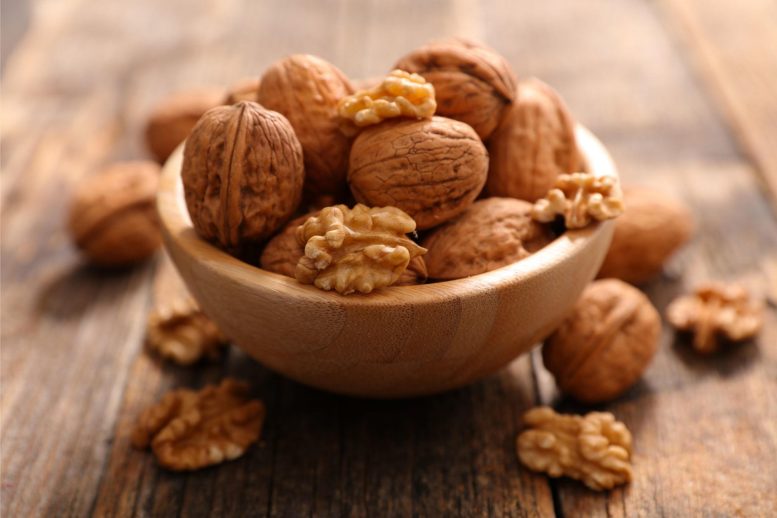
According to new modeling research, incorporating just one ounce of walnuts into the typical American diet can bring a multitude of nutritional benefits for people at all life stages.
According to a recent study conducted by the Indiana University School of Public Health-Bloomington, incorporating just one ounce (or a handful) of walnuts into the diets of individuals who don’t typically consume nuts can improve their dietary quality and increase their intake of crucial nutrients that are often lacking in the average diet.
There is a wealth of consistent evidence indicating that incorporating walnuts as a snack or as part of a meal can contribute to good nutrition and support a healthy diet for an individual’s lifetime.
“While nut consumption is already promoted in the Dietary Guidelines for Americans as part of a healthy dietary pattern, consumers are often not eating enough alongside whole grains, fruit, and vegetables,” says Dr. Thiagarajah, lead researcher on the study and Senior Lecturer of Nutrition at Indiana University School of Public Health-Bloomington.
“Underconsumption of nutritious foods like walnuts as part of a balanced diet can result in nutrient inadequacies. When added to the diet, walnuts lead to small nutrition wins for the whole family,” she adds.
For parents and guardians, ensuring children and adolescents are getting all the nutrients they need can be challenging. This is one of the few studies looking at the typical diet of both children and adults and simulating how the simple addition of walnuts to the diet could help achieve better nutritional status. Incorporating walnuts into snacks and meals may be an easy option for adults and children to consider as part of their diet.
Study Overview
Advanced statistical modeling techniques were used to see what would happen when one ounce of walnuts was added to the typical daily diet of nearly 8,000 Americans who do not currently eat nuts.
Participant health and dietary information were obtained from The National Health and Nutrition Examination Survey (NHANES), which is a nationally representative, cross-sectional survey of people living in the United States. Information was analyzed by age group (4–8 years, 9–13 years, 14–18 years, 19–50 years, 51–70 years, 71 years and older) and gender.
“We primarily wanted to see how adding a handful of walnuts to the typical U.S. diet could change intakes in nutrients of public health concern identified by the 2020–2025 U.S. Dietary Guidelines for Americans, including potassium, dietary fiber, and magnesium,” explains Dr. Thiagarajah.
Researchers then evaluated diet quality with and without the added one ounce of walnuts using the 2015 Healthy Eating Index (HEI-2015).
Results At A Glance
Adding one ounce of walnuts to the typical diets of Americans resulted in the following outcomes listed in Table 1.
Table 1.Summary of the nutrient impact of adding one ounce of walnuts to a typical American diet
| Outcome | Result |
| Healthy Eating Index (e.g., Diet Quality) |
|
| Nutrients of Public Health Importance from the 2020 Dietary Guidelines for Americans |
|
| Other Nutrients |
|
“This was not an intervention or feeding study, but the modeling done as part of this research is highly important as it allows us to evaluate broad dietary implications for the general public which could have meaningful impacts on overall health,” notes Dr. Thiagarajah.
Limitations of this study include the fact that self-reported 24-hour dietary recall data were used to conduct the modeling in this study and are subject to measurement error due to large day-to-day variations in food intake.
Additionally, this study can only be used to explain how adding walnuts to the diet of no-nut consumers may be impacted (n=7,757). No nut consumers tended to be younger, Hispanic or black, and have an annual household income of less than $20,000.
While this modeling study demonstrates a potential positive nutritional impact of walnut consumption, further observational studies or well-designed randomized clinical trials are needed to confirm these results.
A simple strategy such as adding one ounce of walnuts to a daily eating pattern can be a potential solution to improve diet quality for people of all ages. This modeling study clearly demonstrates that small dietary changes with nutrient-dense foods like walnuts may have significant benefits on nutrient intake and diet quality.
Reference: “Adding Walnuts to the Usual Diet Can Improve Diet Quality in the United States: Diet Modeling Study Based on NHANES 2015–2018” by Lisa A Spence, Beate Henschel, Rui Li, Carmen D Tekwe and Krisha Thiagarajah, 4 January 2023, Nutrients.
DOI: 10.3390/nu15020258
The study was funded by the California Walnut Commission.
Never miss a breakthrough: Join the SciTechDaily newsletter.
2 Comments
Haven’t seen this marketing effort for a couple of months. Paid for by the California Walnut Growers. Spare your readers this nonsense, please.
Is.walnut.better.for.kidneys